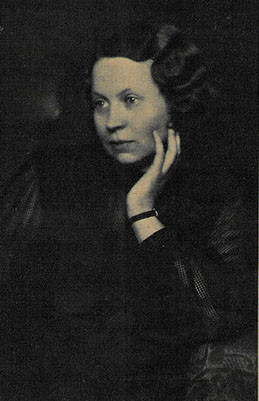
Lūcija Garūta
(14.05.1902 - 15.02.1977 )
"Full of stars – that is what I call Lūcija Garūta in spirit. Her music transports one away from Earth, it brings one to the stars and sun. Her music has the power of tenderness, which purifies and clarifies."
Zenta Mauriņa
Composer, pianist, music theorist and teacher Lūcija Garūta was born on May 14, 1902 in Riga. In 1919, Lūcija Garūta began her studies at the Latvian Conservatory, where she studied piano with Marija Žilinska, Hans Schmidt, and Lidija Gomane-Dombrovska. She also studied composition with Jāzeps Vītols. In 1924, Lūcija Garūta graduated the composition class, and in 1925, the piano class. In 1926, she began studies in Paris, where she studied piano with Alfred Cortot and Isidor Philipp. In 1928, she continued studying composition at the Ecole Normale de Musique in Paris with Paul Dukas.
While studying (1919–1921), Lūcija Garūta was the pianist répétiteur at the Latvian Opera, in 1925–1926 she worked at Latvian Radio, and in 1926 she began her teaching career at the People’s Conservatory (1926–1947). She was a Latvian State Conservatory lecturer (1940–1977, from 1972 – a professor). Almost all of the musicologists and composers who studied at the Conservatory during that time period were students of composition and music theory with Lūcija Garūta.
Along with her teaching work, Lūcija Garūta turned to a career in performance. In 1926, she performed in France (Paris), and, in 1929, in Germany (Berlin, Frankfurt-am-Main). In the 1920s and 1930s, Lūcija Garūta was one of the most active pianists both as a soloist as well as accompanist, performing in Riga and in all of Latvia. Overall, Garūta performed with more than 100 musicians in chamber music concerts. In 1944, at the premiere of her cantata Dievs, Tava zeme deg! (God, Your Land is Burning!) she played the organ. Unfortunately, at the end of 1940, due to health reasons, she had to suspend her concert performance work.
Lūcija Garūta’s creative progress was also overshadowed by the oppression of the ideology of the ruling system. The premiere of her opera Sidrabotais putns (The Bird in Silver) was cancelled twice – first in 1938/39, the second at the beginning of 1960. Her Piano Concerto initially received harsh criticism from the Latvian Composers’ Union. For many years – until the Second Awakening – the performance of her cantata Dievs, Tava zeme deg! was forbidden.
The composer died on February 15, 1977.
All that was important, dear, everything that generated happiness or experience, Lūcija Garūta expressed in her music. Her music is expansive and powerful, but also heartfelt and redolent with Romanticism. It is deeply Latvian, but, at the same time, characteristic of the era. The composer was together with her people in those tragic times, but she was able to maintain faith and hope in a brighter and better future. The quantitative foundation to the works of Lūcija Garūta, totalling almost 200, is songs with the stanzas of many Latvian poets, as well as the poetry of Victor Hugo and Rabindranath Tagore. It is also significant that the half of the song texts were written by the composer herself, always consequently indicating that they are not meant as poems. Also notable are Latvian folk song arrangements – for piano, solo voice with piano, and ensembles. Piano music has an important role in the creative work of Garūta, whose first interpreter was the composer herself, beginning with miniatures up to large form works. The cantata Dievs, Tava zeme deg! is the most significant artistic document of her era, and the cantata’s legendary premiere was in 1944 at the Riga St. Gertrude’s Church. It has not lost its topicality even today, and often is the first composition that is associated with the composer.
Thanks to the work of the Lūcija Garūta Fund, today the composer’s music is performed even more frequently not just in Latvia, but also internationally (Europe, Japan, Canada, and elsewhere).
Daina Pormale, Baiba Jaunslaviete © LMIC, 2007
